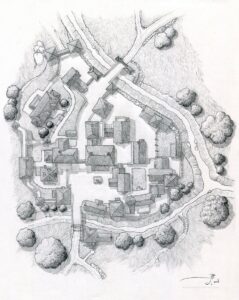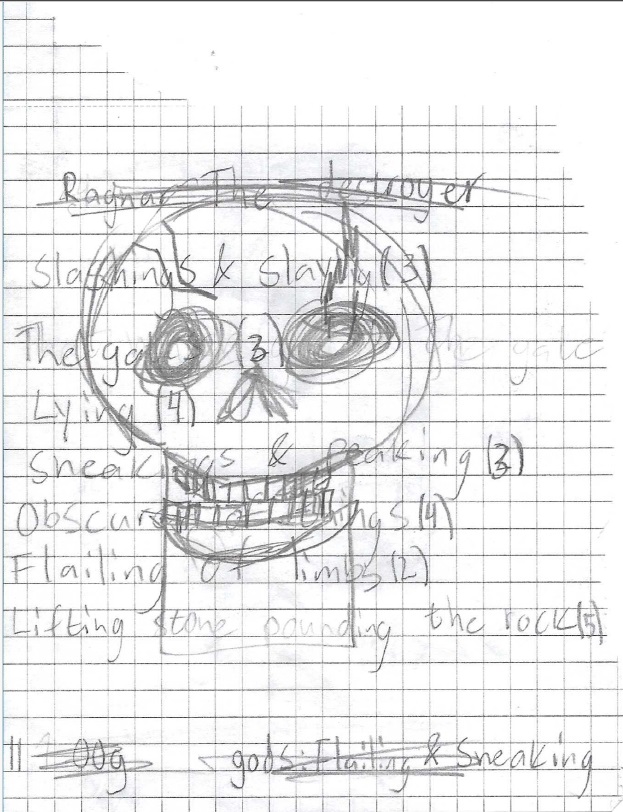The Great Ork Gods, by Jack Aidley, is along with Space Rat one of the quintessential Step On Up designs. It offers a deep insight into the interrelations among “game” (the colloquial term), game theory, and gamification.
… but enough of that elf talk, this is about orks getting Oog, and more importantly, players competing for Oog, because. Play began with Theo, Filip, Neo, and Helma. I did tell the young guys, “watch out for her,” but they didn’t believe me until it was too late. She seemed like such a nice lady …
Here is Little Umplingham, as described in the sample scenario, which I played essentially as written, as I often do. I keep promising to devise some original scenarios based on similar mathematical conundrums, but I haven’t yet because this one is too much fun.

I repeat myself a couple of times in the recordings with the following, but we should have it here in writing:
- An ork starts with 1 Oog, +1 if they have a non-orky name (which also lands them with 1d6 more Hate in their scores)
- Destroying a building is worth 1 Oog to that ork
- Killing the elf or dwarf is worth 1 Oog each, to that ork
- If all three daughters are delivered to the orc chief, then all surviving player-character orks gain 2 Oog
- Killing a daughter is worth 1 Oog each, to that ork
- If and when an ork dies, their Oog dies with them [the player immediately makes up another ork]
- At the end of the adventure, the player with the ork with the most Oog wins
The first session featured the demise of the elf, the remarkable durability of Ragnar the Destroyer, the invention of the “bidge,” and sadly, the death of one ork by dwarf and of another by over-cooking a bull carcass and, as it happens, himself. … as Orange Blossom maneuvered nicely into the leading Oog spot.
Understanding the GM’s jobs is important. It’s simply to identify any time that a player must roll dice and regarding which God, with the supportive fictional job of throwing villagers, animals, the elf, the dwarf, the halfling, and (uh oh) the daughters at them or responding with any of these. Plus all narration of outcomes.
The second session added Arvid and Nils, who were at first a bit surprised at the untrammeled intensity, but managed to throw in with a will, including Arvid’s unashamed defiance of the gods with his great ork names. Technically, you can play with up to seven people along with the GM, but six, in this case, is a real handful to make sure everyone gets the proactivity they need, and Spite plays a bit differently when it’s in so many different hands.
Ragnar met his end here, among others, and everyone finally realized that Helma was kicking their asses. So the evident “take it easy” behavior in session 1 vanished like a sacrificed goblin in favor of “get that ork! no! Spite! ack, argh! damn it!” ultimately with all against all, as you will hear. And no surprise, the daughters were favored by the gods to be far tougher than the dwarf, elf, or halfling could ever hope to be.
I realized while editing that I hadn’t fully instructed the Goblins and Spite rules. Here are the proper rules:
- If you’re the God who governs the task that your ork is attempting, the difficulty is automatically easy and all other players gain a point of Spite if the ork succeeds.
- Once the (any) task difficulty is assigned, then spending Spite to make it harder vs. spending Goblins to make it easier is not organized, but I think a good rules-adjustment might be to say a given player can only assign Spite once per task. After all, you can only spend one Goblin per task.
- Spite is acquired in very specific ways, but Goblins aren’t quantified particularly (“a few”) and the GM says when you’re fresh out of them and when a few more show up.
- Spending a goblin either drops the initially-assigned difficulty to easy, or it cancels a point of Spite.
I got the first one wrong and the second one partly wrong from the start, and various carelessness with the others crept in during session 2 and caused trouble in session 3, so that Nils, especially, didn’t benefit as much as he should have.
I set myself to a “conclusion phase” when the stalwart hero defenders and the daughters were all accounted for one way or another, after which I decided that an infinite supply of villagers would simply impede anything any ork did in town, and eventually the extant orks at that time would all be dead or fled. I don’t suppose I have to tell you who won, but I suspect another adventure will feature five other players thirsting for vengeance.
Here are a few of our orks, all deceased during play except for Bog Stomper, worthy successor to Orange Blossom.
I found it! Jack makes the game available here.


One response to “Oog is all you need”
This game for me is like a summer breeze on a sunny day. Especially enjoyable with this group of players, seeing tactics shift and emotions run high as well as the sometimes unbelievable luck or lack of it. But I swear that I don’t know what Ron is talking about. I am a nice lady and Orange Blossom was such a peaceful and easygoing gal, really no idea why the gods hated her so. Anyway, if you can find the game play it.